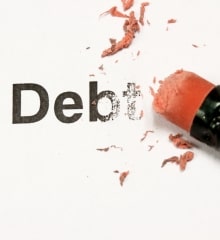Tips to Pay off Credit Card Debt: The Realities of Escaping the Debt Vortex

Every time I browse the internet for debt topics, I am bombarded with articles offering the same old advice on how to manage and get rid of credit card debt. "Focus on one debt at a time," "Pay the highest interest first," "Use windfalls wisely," and of course, "Try the snowball method." While these strategies might be beneficial for individuals who've accumulated a slightly uncomfortable amount of debt, they don't even scratch the surface of the issue for those drowning in financial despair.
Here’s the generic “How to get out of credit card Debt” plan
Key Points:
- To address credit card debt, create a plan and adhere to it.
- Prioritize cards with higher interest rates or smaller balances.
- Paying more than the minimum monthly reduces total interest.

Strategies:
Target One Debt at a Time:
- If you have balances on multiple cards, pay at least the minimum for each.
- Focus on High-Interest Debt: Pay off the card with the highest interest first.
- Use the Snowball Method: Settle the smallest balance first, then use that amount to pay the next smallest.
Pay More than the Minimum:
- Paying just the minimum prolongs the settlement of your bill. Overpay to reduce total interest.
- Quick Tip: Add a bit extra to your monthly payments. Every surplus dollar reduces your balance and subsequent interest.
Consolidate Debt:
- Combine multiple high-interest debts into a single lower-interest one.
- Transfer Balances: Use low balance transfer rates to shift from high-interest cards. Note that transfer fees may apply but could be offset by the savings from the reduced rate.
Use Home Equity: If you have home equity, it might offer a rate lower than your cards. Closing costs might apply.
- Remember: Post consolidation, control your expenditure to prevent accumulating fresh debt.
Review Your Spending:
- Categorize your expenses: e.g., groceries, transport, housing, entertainment. Use your card statement as a guide.
- Spot areas to save, and use the saved amount to reduce debt.
Pay with Cash: This avoids overspending and any additional card fees. It also provides a clear picture of your financial in-flow and out-flow.
Utilize Financial Windfalls: Allocate unexpected gains like bonuses or raises to debt reduction instead of regular spending.
Most people I encounter are trapped in a debilitating cycle, living paycheck to paycheck, with debts that far exceed their ability to repay. For them, such advice doesn't just fall on deaf ears – it's condescending and demoralizing. Let's be honest, nobody willingly commits to a 110% payday loan because they've got a stash of cash lying around.
The underlying sentiment of these articles, for me, is clear: those writing this "advice" might as well be in cahoots with those charging a staggering 29% on credit cards. There's a vast swath of individuals whose new debts merely serve to cover old ones. The little "extras" these articles speak of are non-existent for these folks.

So, what's the real advice?
For many trapped in the vicious circle of spiraling debt, insane interest rates, and minuscule payments, there's an avenue they're seldom told about: bankruptcy. Here's why considering bankruptcy might be the lifeline you've been searching for:
- Lenders Exist to Lend: After filing for bankruptcy and having your debt discharged, you're not blacklisted forever. Lenders will approach you again. Only this time, you won't be in a vulnerable position, desperately accepting their absurd terms.
- Rebuild Your Credit: Post-bankruptcy provides a fresh opportunity to rebuild your credit score. Consider obtaining a secured credit card or two. Maintain utilization below one-third of the limit, and ensure you settle the full balance monthly. You'll be surprised at how swiftly your credit score can rise.
- No Shame in the Bankruptcy Game: If you're burdened by shame or stigma surrounding bankruptcy, it's time to shed it. The missteps happened when the debts were acquired, not when seeking a fresh start through bankruptcy.
Unfortunately, most individuals only turn to bankruptcy as a last resort, after exhausting all other strategies orchestrated by those profiting off high-interest rates. If you're grappling with overwhelming debt, consult a bankruptcy attorney. Discover your rights. Firms like DebtStoppers offer free consultations, ensuring you're informed about your best next steps.
Final Thoughts on Credit Card Debt
The bottom line is, if you're sinking in debt, there are lifelines available. Make sure you're exploring all your options rather than being funneled down a path designed by those benefiting from your financial despair. And don’t cash in your home equity.





